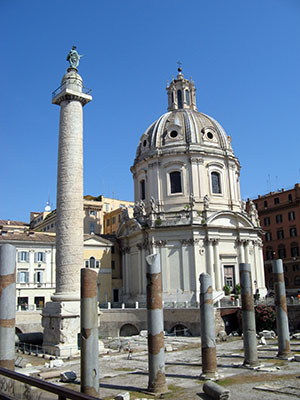In many respects, the ancient Romans created the foundation of the Western world through the political unity that they brought to Europe, the Mediterranean and the Near East and through their idea of a civic polity ruled by a conception of law. The Roman empire was one of the first, and largest, supranational (or multinational) political institutions to ever exist in the world. In that empire, people from all different societies could be equally treated as Roman citizens. Citizenship was not limited to just the Latins from the area around Rome itself; citizenship was extended to conquered people everywhere. That was one of the secrets of Roman success; that and the brutal efficiency of Roman arms.
The Roman achievement in practical governance and law, as well as the spread of the Latin language, was passed on to the eventual "barbarian" successors. Understand that it was no mean feat to be able to administer such a large empire efficiently. Efficiency meant that administration could not be based simply on inherited noble positions. The administration had to be based on competent people who rose to those positions from all walks of life (well, almost from all walks of life).
But for all of Rome's greatness, it is important to remember that the Roman Empire was an empire based on military conquest. That could be a brutal conquest, but in many cases, once conquered Rome's former enemies became an important part of Rome and frequently served in the Roman legions. But there was a problem inherent to an empire built on expansion. Once that military expansion ended, then the inexpensive supply of slaves that had fueled the empire's economic growth ended. That brought ruin to the Roman economy and was one of the factors leading to the decline of the empire.
There is no question that Roman preeminence in the West lasted a very long time. Today, in these days of rapid change, it is difficult to imagine how this one city could dominate Europe and the Mediterranean from the third century BCE to the fourth century CE (not to mention the continued existence of the Roman Empire in the Eastern Mediterranean, as the Byzantine Empire, until the fifteenth century). That's an unbelievably long span of time! And, what is more remarkable, very little actually changed in that span of eight centuries in the west. The continuity and stability achieved by Rome was enormous, and much of that continuity was the result of hard work by Roman citizens and their civic mind set, i.e., their idea of devotion to the state. That hard work paid off in a comprehensive system of law that remained intact over the centuries and that provided a solid framework for the society and economy. It was a framework passed on to the barbarian kingdoms that succeeded Rome.
Finally, it was the Roman Empire that became the mechanism enabling the spread of Christianity. (Check out my notes.) For literally centuries, Christianity was basically a minor religious sect within the empire that was, at times, the object of terrible persecution, but in the fourth century, as the empire crumbled, Christianity assumed an increasing role as a spiritual bulwark against the travails of life and the immediacy of death. Eventually, after being legalized by Constantine, Christianity became the official religion of the empire in 1380. (See The Conversion of Constantine.)
![]()
Some recommended online lectures and websites
- Wikibooks: World History/Ancient Civilizations (The Roman Empire)
- The Roman Republic and the Roman Empire (fairly extensive notes)
- Roman Emperors and Rulers project
- Rome: Republic to Empire by Barbara McManus, College of New Rochelle, has some very well-done web materials on different aspects of Roman history and culture.
- Rome, created by a consortia of museums, is a deceptively simple though very rich set of online resources.
- The Pax Romana by Charles Kimball
- Murderous Games: Gladiatorial Contests in Ancient Rome
- The Roman Pantheon: Triumph of Concrete by David Moore If you are interested in building and in the use of concrete by the Ancient Romans, then this is the site for you.
- For extra credit please suggest to your instructor a relevant website for this unit of the course. Send the title of the site, the URL and a brief explanation why you find the information interesting and applicable to the material being studied in this unit.
